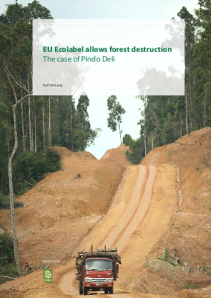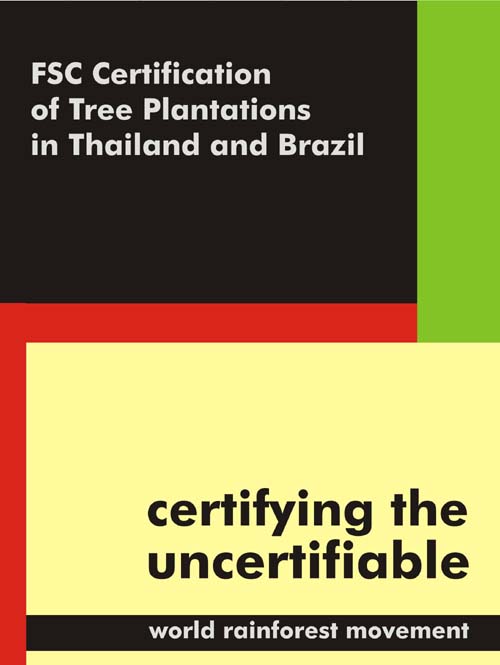Conflict of interest, GM trees and FSC certification of Fletcher Challenge Forests’ plantations.
By Chris Lang. Published in WRM Special Bulletin FSC certification of Plantations, February 2001.
In October 2000, all of Fletcher Challenge Forests’ New Zealand plantations received Forest Stewardship Council certification, after an evaluation carried out on behalf of Scientific Certification Systems (SCS). Included in the certification is the world’s largest continuous radiata pine plantation.
Ian Boyd, Fletcher Challenge Forests’ then-Acting Chief Executive, said, “Forest Stewardship Council Certification will provide Fletcher Challenge Forests with a significant marketing opportunity in those markets which demand environmental responsibility.”
However, the certification of Fletcher Challenge Forests’ operations raises serious questions about SCS’ assessment process, as well as about Fletcher Challenge Forests’ plantation management itself.
According to FSC principle 6, all World Health Organisation type 1A and 1B pesticides “shall be prohibited”. Fletcher Challenge Forestry uses sodium fluoroacetate. Commonly known as 1080, it is a poison used to kill wildlife such as possums, which can damage plantation trees. In SCS’ public summary of the assessment of Fletcher Challenge Forests’ operations, the assessors acknowledge that 1080 is “a compound appearing on WHO Table 1”. Yet, rather than refusing to award the certificate, SCS applied a condition which is so loose it is almost meaningless: “Within 12 months of award of certification, Fletcher Challenge Forests should be able to demonstrate that they are actively seeking alternatives to 1080, e.g. by supporting research into alternatives.”
In other words, Fletcher Challenge Forests can continue to use 1080 without risking their FSC certificate, as long as they support research into alternatives. SCS does not mention what form such support should take, or even if it matters whether the research yields any results or not.
FSC principle 2 states that disputes over land rights “of a substantial magnitude . . . will normally disqualify an operation from being certified.” To the Maori, land is sacred and they have several outstanding land claims on Fletcher Challenge Forests’ plantation land under the 1840 Treaty of Waitangi. In their assessment, SCS’ assessors describe the “uncertainty over ownership of a significant proportion of [Fletcher Challenge’s] forest lands” as a “significant” issue. Once again however, this does not prevent SCS from awarding the certificate.
According to FSC Principle 6, “Use of genetically modified organisms shall be prohibited”. Since 1995, Fletcher Challenge Forests has worked with Genesis Research and Development Corporation, New Zealand’s biggest biotechnology company, on research into genetic modification of trees. SCS’ assessors acknowledge that Fletcher Challenge Forests is involved in research on genetically modified plant tissues. Although Fletcher Challenge Forests does not currently use genetically modified trees in its plantations, rather than discussing whether Fletcher Challenge Forests’ research conflicts with the spirit of FSC principles, the public summary of the assessment simply states: “All materials are classed as low risk and the laboratory is fully compliant with regulatory requirements.”
In 1999 Fletcher Challenge Forests, Genesis, Monsanto, International Paper and Westvaco announced a US$60 million joint venture. The joint venture company, called ArborGen, will produce and market genetically modified tree seedlings, focussing on radiata pine and eucalyptus trees in New Zealand. Monsanto has since withdrawn from active partnership.
Whether Fletcher Challenge Forests use the genetically modified seedlings in its own plantations or, as part of the ArborGen joint venture, sells them to other forestry operations, Fletcher Challenge Forests is effectively using genetically modified organisms, and promoting their use in forestry operations. Whether Fletcher Challenge Forests is therefore in breach of FSC’s principles should surely be a matter for the assessors to discuss in the public summary of the assessment. Yet, in describing Fletcher Challenge Forests’ research and development activities, the assessors conclude: “The company has a clear commitment to the FSC principles”.
Three of the four assessors hired by SCS to carry out the assessment of Fletcher Challenge Forests’ operations work for the New Zealand company Forest Research. In 1982, Forest Research hosted an international meeting on genetic research with radiata pine. By September 1995, the institute’s greenhouses in Rotorua were stuffed full of genetically modified radiata pine. Forest Research also runs projects funded by Fletcher Challenge Forests. Could this perhaps explain the assessors’ unquestioning acceptance of Fletcher Challenge research into genetically modified trees?









